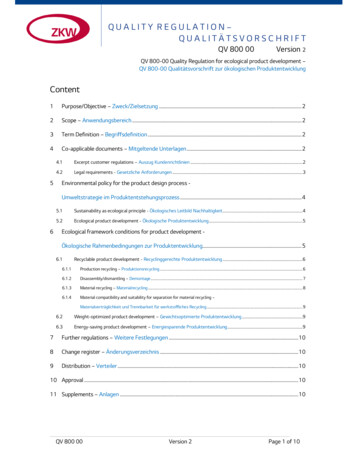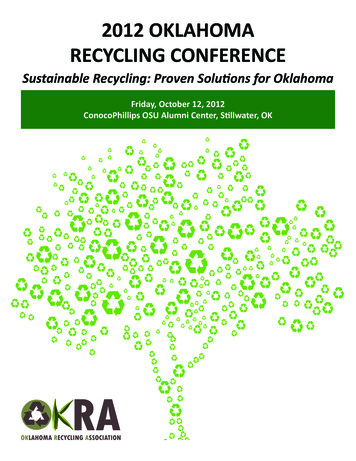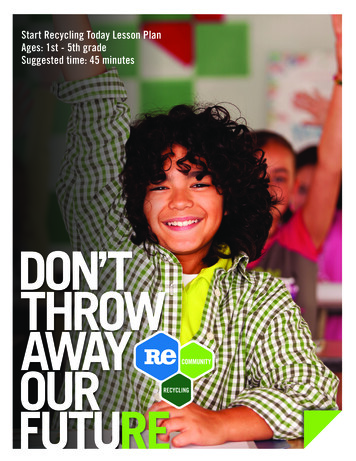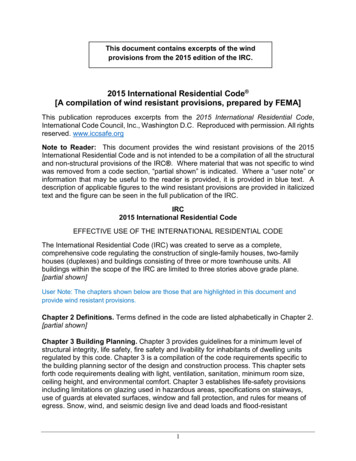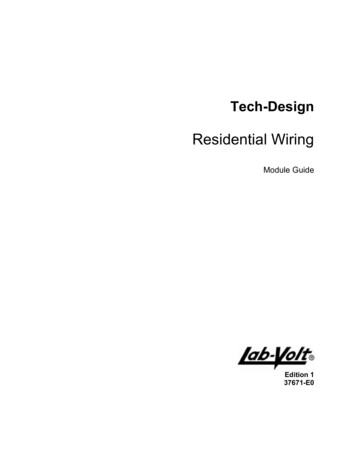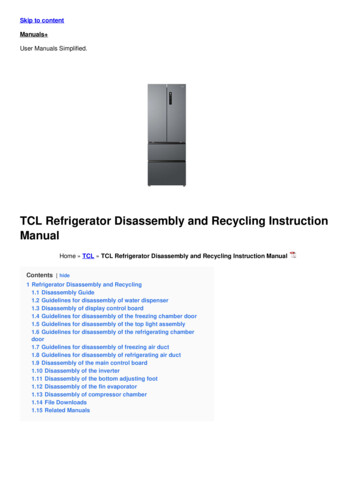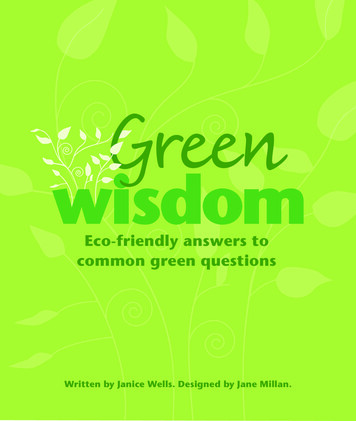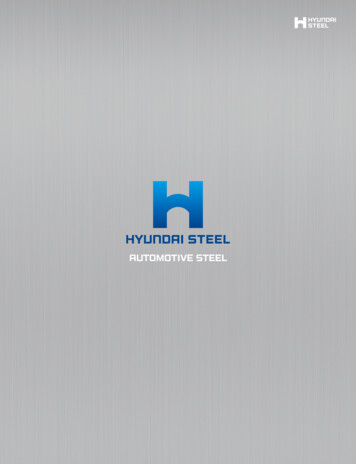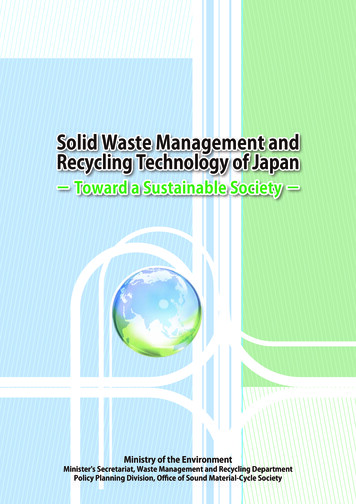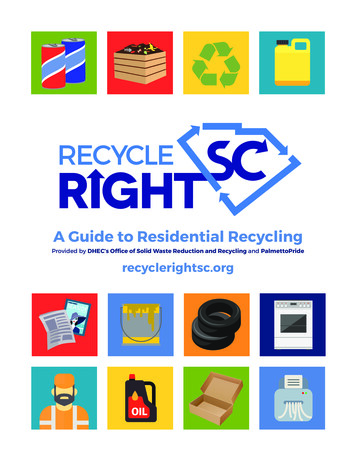
Transcription
A Guide to Residential RecyclingProvided by DHEC’s Office of Solid Waste Reduction and Recycling and PalmettoPriderecyclerightsc.org
Do your partand Recycle Right SC!Recycling is working in South Carolina, butthere is room for improvement. Each of us –individuals, businesses, organizations, schools– needs to do our part. That means not onlyrecycling but recycling right.Recycling contamination happens when:1.Items not accepted for recycling are placedin the recycling bin; or2. Items accepted for recycling are not prepared properly (e.g.,food or liquid left in containers, bagged recyclables).Only recycle items that your local program accepts.Contamination results in significantly increased costs andlabor to remove. The entire collected load may even have to bedisposed of if the contamination is too great. Increased costs alsocan lead to the elimination of accepting certain material or thediscontinuation of the program.Recycle right, South Carolina.Acknowledgements“Recycle Right SC: A Guide to Residential Recycling” is published byDHEC’s Office of Solid Waste Reduction and Recycling.Editor . Alexandra MillerLayout/Graphics . Gregg GlymphContributors . Richard Chesley and Adah GortonVisit scdhec.gov/recycle or call 1-800-768-7348 for more information.ContentsWhy Should I Recycle? . 3How DoesRecycling Work? . 4Recycling: The Basics . 5Recycle Hard-to-ManageItems .6Help Make a Difference . 7 Manage UnwantedMedications . 7 Safely Disposeof Needles . 7Recycling’s Dirty Dozen .8Home Isn’t the OnlyPlace to Recycle .9 Recycling at School .9 Recycling at Work .9 Recycling atColleges/Universities .9More Actionsto Reduce Waste .10 Backyard Composting .10 Used Motor OilRecycling .10 Stop Unwanted Mail .10 ReduceFood Waste .10Litter Trashes Everyone . 11 Report Illegal Tire Piles . 11Recycle Right SC is an outreach campaign directed at South Carolina residents and designed toincrease awareness of how to recycle correctly and help reduce contamination. The campaign –created in partnership between the S.C. Department of Health and Environmental Control andPalmettoPride – provides information, tools and resources to help make recycling both easy andeffective. Visit recyclerightsc.org for more information.2Recycle Right SC Guide
Why Should I Recycle?RECYCLING CREATESJOBS.In South Carolina, 500-pluscompanies provide about22,000 jobs that rely onquality recycled material.RECYCLINGPROTECTS THEENVIRONMENT.Recycling reducespollution associated withthe extraction of rawmaterial.RECYCLING MEANSBUSINESS.Recycling has an estimated 13 billion annual economicimpact. Since 2015, thestate’s recycling industry hasmade 1.6 billion in capitalinvestments.RECYCLING SAVESNATURAL RESOURCES.Reducing, reusing,and recycling lessensthe amount of naturalresources needed to makenew products.RECYCLING CONSERVES ENERGY.Recycling saves energy by reducingthe need to extract and refine naturalresources. It often takes less energy toprocess recycled material than usingvirgin materials in manufacturing.RECYCLING SAVES LANDFILL SPACE.The more you recycle,the less waste goes tothe landfill. REMEMBER:The most effectiveway to reducewaste is to notcreate it.RECYCLING TURNSWASTE INTO RAWMATERIAL.Manufacturers rely onquality recycled materialto turn into raw materialto make recycled-contentproducts.Recycle Right SC GuideRECYCLING REDUCESGREENHOUSE GAS (GHG)EMISSIONS.Recycling decreases thegeneration of GHG emissions (e.g.,CO2, methane) by saving energyin the processing of material fornew products. It also reduces theamount of organics in landfillswhere decomposition produces methane.RECYCLING INCREASESECONOMIC SECURITY.Recycling reduces reliance onimported raw material. Buildinga robust domestic recyclinginfrastructure provides more jobsand benefits the local economy.RECYCLING IS EASY.All 46 counties have recycling programsfor residents. There are more than 60curbside programs and nearly 550recycling centers across the state.3
THE3STEPRECYCLINGHow Does Recycling Work?Recyclingis a three-steploop thatwasteinto intoraw rawmaterialto makenew newproducts.Recyclingis a three-stepprocessthat turnsconvertswastematerialto makeproducts.1COLLECTION& PROCESSINGRecyclablesare collectedand processedfor recyclingvendors.Items are collected either separately or together(single-stream). Then items are either .1.2.Taken to a Material Recovery Facility to besorted, baled and sent to a recycling market; ORBaled material is sent directly to a recyclingmarket.DO NOT BAGRECYCLABLES!Plastic bags are the No. 1contaminant. Reuse, recycle at agrocery store or give to a food bank.3Buyingrecycled-contentproducts ensuresthe successand value ofrecycling.Recyclablesare sold tomanufacturersto make newrecycled-contentproducts.BUY RECYCLED! MANUFACTURINGPlastic bottles, jugs and jars make new bottles,clothing, rulers and backpacks.Glass bottles, jugs and jars make new bottles,jars and fiberglass. Newspaper and cardboard become paper, pens,boxes and insulation. Steel cans become bicycles, nails and even cars.Aluminum cans make new cans and lawnfurniture.2 Plastic bottles, jugs and jars are chipped, meltedand remolded.Glass bottles, jugs and jars are ground into finegrains, melted and molded.Newspaper and cardboard are shredded, pulped,dried and flattened.Steel and aluminum cans are crushed, melted andflattened into sheets.ONLY RECYCLE what is accepted in your program. Visit scdhec.gov/recycleheresc.41-800-768-7348 recyclerightsc.orgOR-2112 4/21 PRINTED ON RECYCLED PAPERRecycle Right SC Guide
Recycling: The BasicsRecycling starts with you!Recycling begins when you place the correct items in the cart, bin or drop-off sitecontainer. The material is picked up, taken to a facility where it is prepared for market,sold and used to manufacture a new product. See “How Does Recycling Work?” onpage 4. Here are answers to four frequently asked questions about recycling.1WHAT AND WHERE CAN I RECYCLE? Itemscommonly accepted include aluminum andsteel cans, plastic bottles and jugs, cardboardand newspaper. It is important to only recyclewhat is accepted by your program. Learn whatyour local program accepts and where to recycleat scdhec.gov/recycleheresc.2WHAT CAN’T I RECYCLE?Programs differ fromcommunity to community.Common items not acceptedinclude plastic bags andshredded paper. See page 8 for“Recycling’s Dirty Dozen” for othercommon contaminants. When indoubt, throw it out.3WHY ISN’T THIS ITEM ACCEPTED? Marketsand costs determine whether an item isrecyclable in your area. If a recycling vendor istoo far away, collection and hauling may be toocostly for a local government. Know what yourrecycling program accepts. Household Electronics– Counties providecollection at drop-offsites and/or at single-dayevents. Many retailersand manufacturers alsooffer take-back programs. Consider donatingworking electronics to a non-profit. Tires – Retailers, in mostcases, accept and takeresponsibility for old tiresfrom residents buying newtires. There is a 2 advancerecycling fee on each newtire purchased. In addition,counties accept waste tiresfrom residents (often with a per visit limit). Lead-Acid Batteries –Retailers accept oldlead-acid batteries fromresidents buying newbatteries. There is a 7advance recycling fee oneach new battery purchased. If you returnthe old battery when buying a new one,you will receive a 5 credit and be chargedonly 2. In addition, many local recyclingprograms also accept batteries. Used Motor Oil – There are morethan 900 collection sites acrossthe state for do-it-yourself oilchangers. The network includeslocal government drop-offsites and participating retailers(e.g., AutoZone, Advance AutoParts, O’Reilly Auto Parts, JiffyLube,TM NAPA Auto Parts ). Not all retailersparticipate. Make sure to call ahead.4IS IT THE LAW TO RECYCLE IN SOUTHCAROLINA? Yes and no. Recyclingis voluntary with some exceptions. Largeappliances, household electronics, tires,lead-acid batteries and used motor oil arerequired by law to be recycled. These items areaccepted at county drop-off locations and/orsingle-day events as well as at many retailers. Large Appliances (e.g.,refrigerators, stoves, washers,dryers) – If you buy a newappliance, ask the retailer totake back your old one. Alsocheck to see if your countyaccepts large appliances.Recycle Right SC Guide5
Recycle Hard-to-Manage ItemsSome items are more difficult to manage than traditional recyclables. These typically are notcollected in residential recycling programs, but other options may exist such as single-daycollection events and/or retailer programs.Always check with your local government recycling coordinator about recycling options availableand/or visit scdhec.gov/recycleheresc.llllAntifreeze – Many countiesaccept antifreeze at drop-offsites. In addition, car dealerships,automotive repair shops andquick lube stores may also offercollection programs.Oil Filters & Bottles – Counties andbusinesses that collect used motor oilfrequently also accept used motor oil filtersand bottles from do-it-yourself oil changers.lPaint – If paint is usable, donateit to a school, non-profit orother group. Counties mayaccept latex-based or oil-basedpaint for recycling or reuse. Ifpaint cannot be used, donatedor recycled, properly prepare it for disposalfollowing these steps.Compact Fluorescent Lamps (CFLs) andFluorescent Tubes – Some counties acceptCFLs and/or fluorescent tubes in permanenthousehold hazardous waste programs or atsingle-day events. Check with your countyrecycling coordinator. Retailers (e.g., Lowe’sTM,The Home DepotTM, Batteries Plus BulbsTM)also may accept CFLs and/or fluorescenttubes. Always check with the retailer first.1.Cooking Oil – Most counties accept cookingoil at one or more drop-off locations. Ifrecycling isn’t available, dispose of properly.Household HazardousWaste (HHW) – Somecounties have permanentcollection programs and/orsingle-day events to collectHHW (e.g., automotivefluids, cleaners, pesticides,pool chemicals). If the product cannot beused or recycled, properly dispose of it byfollowing the label instructions. NEVER pourdown a drain, on the ground or in the toilet.Visit epa.gov/hw/household-hazardouswaste-hhw for more information.lMercury Thermostats – ThermostatRecycling Corporation offers a nationalmercury recycling program. Visitthermostat-recycle.org to find a location.Remove the lid and allow the paintto dry. Do this in a well-ventilated areaaway from children and pets.2. Add cat litter, shredded newspaper,sand or sawdust to the paint to speed upthe drying process. Stir occasionally.Gasoline or Gasoline/Oil Mixtures – Mostcounty programs accept gasoline or oil/gasoline mixtures at certain drop-off sites.l6l3. Once the paint is dry, dispose of it withhousehold garbage.lRechargeable Batteries– Best Buy , Lowe’sTM,Target , The Home DepotTMand other large retailersmay accept rechargeablebatteries for recycling fromconsumers at no charge.Visit call2recycle.org to find the closestlocation. Batteries Plus BulbsTM may alsoaccept these batteries. For more details, visitbatteriesplus.com/t/recycling.Earth 911 has a comprehensive informationnetwork of where to recycle common andhard-to-manage items. Visit earth911.com.Recycle Right SC Guide
Help Make a Difference1Learn about your community’s recycling program. Know what is acceptedby your local program. Visit scdhec.gov/recycleheresc to learn what andwhere to recycle or visit your local government’s solid waste website.23Participate. If you do your part correctly, environmental benefits increaseand the recycling program becomes more cost efficient.Recycle right. Certain items (e.g., plastic bags, foam cups/plates, stringlights) don’t belong in your curbside recycling bin. See “Recycling’s DirtyDozen” on page 8 for common recycling contaminants. When in doubt,throw it out.4Recycle with retailers. Many retailers take specific items for recycling (e.g., householdelectronics, rechargeable batteries, printer cartridges, mercury thermostats, compact fluorescentlamps) that are not accepted by the local government program. See page 6 for more information.5Recycle at work, school and on-the-go. For businesses, visit scdhec.gov/smartbusiness. For K-12schools, visit scdhec.gov/k12recycling. For colleges/universities, visit scdhec.gov/recycleu. Forstate parks, visit southcarolinaparks.com/recycling.6REDUCE YOUR OVERALL WASTE. Americans generate almost 5 pounds of waste every day; doyour part to produce less. Use reusable bags, containers, and water bottles. Stop unnecessarymail. Compost. Buy only what you need. Recycle right.Manage UnwantedMedicationsExpired, unwanted or unusedmedications should be disposed of properly.Take-back programs provide a safe wayto manage unwanted medicine. Sometake-back options that may be available inyour community include: Pharmacies (e.g., CVS, Walgreens); Dispose My Meds (learn more atdisposemymeds.org); Local law enforcement offices; or A National Prescription DrugTake-Back Day held nationwide twice ayear through the U.S. Drug EnforcementAdministration.Safely Dispose of NeedlesNeedles, syringes and lancets fromat-home, self-administered injectionsmust be properly disposed of to preventthe spread of disease and harm toothers. DHEC’s “Get the Point” campaignprovides the following steps for residentsto safely manage these items. NEVER throwuncovered sharps into the trash or toilet.1.Find an empty bleach, detergent orsimilar bottle/jug.2. Place a “Get the Point” warning stickeror tape a copy of the PDF download onthe bottle.3. Place used needles, syringes or lancetsin the bottle.Always check ahead to ensure collection isoffered and what is accepted.4. When about 75 percent full, tightlysecure the cap and dispose of the bottlein your household trash.To learn more about proper disposal, visitscdhec.gov/unwanted-medications.To order stickers or download the free PDF,visit scdhec.gov/getthepoint.Recycle Right SC Guide7
Recycling’s Dirty DozenNEVER PLACE THESE 12 ITEMS IN YOUR CURBSIDE RECYCLING BIN!616236PLASTICBAGSBAGGEDITEMSFOOD& LIQUIDSReuse, recycle atthe grocery store orgive to food banks.Don’t bag recycleditems. Keep loosein the bin.Empty and rinsecontainers that canbe recycled.56HAZARDOUSMATERIALSCheck local programoptions or disposeproperly.96SCRAP METALSome metaldamages machinery.Most drop-off siteswill accept.66FLATTENED CANS& BOTTLESKeep the originalshape to preventsorting jams.10676NON-RECYCLABLEPLASTICSee what type ofplastic is accepted inyour program first.116NON-RECYCLABLEGLASSCAPS ONGLASS BOTTLESDon’t place dishes,bulbs, mirrors orwindows in the bin.Remove anddiscard caps beforerecycling.64ROPE-LIKEITEMSHoses, wire andstring lights jamsorting equipment.68SHREDDEDPAPERIt can become litteror jam recyclingfacility equipment.126BIO-HAZARDOUSWASTESyringes, diapers andsimilar items canharm workers.WHEN IN DOUBT, THROW IT OUT!8Recycle Right SC Guide
Home Isn’t the Only Place to RecycleRecycling at SchoolIn South Carolina, more than 1,260 schools with about 50,000 teachers/staff and 760,000 students generate significant amounts of waste – thevast majority of which could be prevented, recycled or composted.These actions help reinforce the importance of sustainable materialmanagement.DHEC’s Office of Solid Waste Reduction andRecycling is designed to help schools not onlyteach students but also develop successful wastemanagement programs for the school through: Technical assistance; Curriculum supplement; Teacher training; Workshops; Classroom presentations; and Grant funding.Visit scdhec.gov/k12recycling for more information and to download theguides pictured. If you want to have recycling education brought to yourschool through the Take Action SC Environmental Education team, visittakeactionsc.org.Recycling at WorkBusinesses and industry account for morethan 60 percent of recycled material inSouth Carolina. Recycling is not only goodfor the environment and the economybut also for a company’s bottom line.Recycling may save a business moneyin avoided disposal costs and cancreate new revenue from the sale ofrecovered material.The S.C. Smart Business Recycling Program is a free,confidential initiative designed to: Help businesses reduce their environmental impact; Provide technical assistance to begin or expandwaste reduction and recycling programs; and Recognize businesses for their recycling andreporting efforts.To learn more, visit scdhec.gov/smartbusiness.Recycle Right SC GuideRecyclingat Colleges/UniversitiesRecycle U is acomprehensiveprogramthat providestechnicalassistance, bestmanagementpractices and outreachmaterial to S.C. colleges/universities in order toimprove waste reduction,recycling and compostingprograms on campus.Visit scdhec.gov/recycleu formore details.9
More Actions to Reduce WasteBackyard CompostingThinking aboutcomposting in thebackyard? It’s easy withonly a little bit of effort.Composting is nature’sway of recycling. Itinvolves little equipment,expense or expertisebut produces a valuablegardening product.The “Composting: Recycling Naturally” guideaddresses all you need to know to compostat home.Stop Unwanted MailCatalogs, credit card offers,and other advertisementscan overwhelm yourmailbox. One studyestimated that eachhousehold receivesmore than 40 pounds ofunwanted mail each year.Most of it can be recycled –including envelopes with windows. But becareful. Credit card applications and otherunwanted mail containing any personalinformation should be shredded andthrown away. For more information, visitscdhec.gov/unwanted-mailidentity-theft.To download the guide and for additionalinformation, visit scdhec.gov/compost.Reduce Food WasteUsed Motor OilRecyclingIn South Carolina, it’s the law to recycleused oil.Used motor oil can contain hazardoussubstances such as heavy metals that posepotential risk to the environment andhuman health. There are more than 900collection sites throughout the state fordo-it-yourself (DIY) oil changers to take usedmotor oil for recycling. Many accept oil filtersand oil bottles for recycling as well.Visit scdhec.gov/used-motor-oil-recyclingfor more information.RECYCLE10Food is the No. 1 itemAmericans throw away.Each year up to 40percent of the U.S. foodsupply is not consumed– a projected loss of 218billion nationwide. Allof this while 50 millionAmericans – including17 million children –experience food insecurity.Don’t Waste Food SC is a campaigndesigned to increase awareness of theeconomic, environmental, and socialimpacts of wasted food and inspire actionsto reduce it. “Don’t Waste Food SC: A Guidefor Reducing Food Waste at Home” providessimple steps to waste less food, help feedthose in need, and save money. Learn moreand download the guide at scdhec.gov/dwfsc.Recycle Right SC Guide
Litter Trashes EveryoneLitter is costly to clean up, adversely affects environmentalquality, causes harm to wildlife and negatively impacts economicdevelopment. More than 80 percent of all litter is intentional andas much as 75 percent is material that could have been recycled.Here are 10 tips to help prevent litter.1Set an example by not littering. In South Carolina, it isAGAINST THE LAW to dump, deposit, discard or dispose litteror solid waste (including cigarette butts) in waterways or onpublic/private property. Violators may be fined or even jailed.2345Keep your yard clean and free of things that can blow intothe street.When out and about, keep trash and recyclables in a bag orbackpack to dispose of properly at home.Make sure garbage bags are tied securely and container lidsare closed tightly. Do not overfill collection containers.Tie down your load – it’s the law. Vehicle or trailer loads mustbe securely fastened to prevent items from falling out andcreating litter and/or driving hazards.6Organize neighborhood cleanups and beautificationprojects. PalmettoPride has litter pick-up programs tohelp make South Carolina litter free. For more information, s.7Educate family and friends about preventing litter andreducing waste. Stress the importance of proper disposal andthe impact litter has on the environment and wildlife.8Report litterbugs. Call PalmettoPride’s Litter Busters Hotlineat 1-877-7-LITTER or use the “Report a Litterbug” option .Report IllegalTire PilesIllegally dumped tirescreate health andenvironmental risks. Tirescollect rainwater andprovide a breeding groundfor mosquitoes that cantransmit illnesses. Tirepiles are fire hazards andcan be very difficult toextinguish. They releasetoxic air pollutants andgenerate oil that cancontaminate the groundand surface water.The “See It. Report It.”campaign encouragesresidents to quickly andanonymously report illegaltire dumps. The campaignis a partnership withDHEC, PalmettoPride andthe S.C. Department ofNatural Resources.To report a tire pile, seeTip No. 8 or contact yourlocal DHEC EnvironmentalAffairs Regional Office.Learn more at scdhec.gov/see-it-report-it.9Ask your local school to teach lessonsabout protecting the environment. BothPalmettoPride and DHEC offer K-12 environmentallessons. Visit palmettopride.org/education andtakeactionsc.org for more information.10Support businesses that have responsiblesolid waste policies, participate in litterpick-up programs or offer recycling programs.PalmettoPride is South Carolina’s anti-litter andbeautification non-profit, 501(c) 3 organization. KeepSouth Carolina Beautiful (KSCB) is the state affiliateof Keep America Beautiful. Assisting with education,training, program development and more, KSCB isa key part of PalmettoPride and helps expand itsprograms and volunteer-base.Recycle Right SC Guide11
Recycling ResourcesS.C. Department of Health and Environmental Control (DHEC)Website . scdhec.govEmail . info@dhec.sc.govDHEC’s Office of Solid Waste Reduction and RecyclingTelephone . 1-800-768-7348Website . scdhec.gov/recycleRecycle Right SCWebsite . recyclerightsc.orgEmail . recyclelocal@dhec.sc.govPalmettoPride/Keep South Carolina BeautifulTelephone . 1-877-PAL-PRDELitter Busters Hotline . 1-877-7LITTERWebsite . palmettopride.orgEmail . info@palmettopride.orgPRINTED ON RECYCLED PAPER OR-2225 7/21About the OfficeDHEC’s Office of Solid Waste Reduction and Recycling (Office) was created by the S.C. SolidWaste Policy and Management Act of 1991 (Act). The Act – prioritizing recovery over disposal– outlines specific responsibilities for the Office that include providing technical assistance,outreach/education programs and campaigns as well as grant funding to local governments, K-12schools and colleges/universities.Key programs and campaigns include Recycle Right SC, the Recycle Guys, Don’t Waste Food SC,the S.C. Smart Business Recycling Program, the Green Government Initiative, Recycle U and TakeAction SC. The Office also produces several reports including the “S.C. Solid Waste ManagementAnnual Report.”Learn more at scdhec.gov/recycle or call 1-800-768-7348.
residents buying new batteries. There is a 7 advance recycling fee on each new battery purchased. If you return the old battery when buying a new one, you will receive a 5 credit and be charged only 2. In addition, many local recycling programs also accept batteries. Used Motor Oil - There are more than 900 collection sites across
